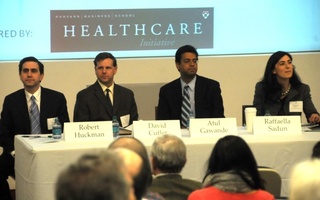
Atul Gawande, bestselling author, surgeon, and Associate Professor at Harvard Medical School and Harvard's School of Public Health, discussed his newest release, The Checklist Manifesto, in Fong Auditorium. Dr. Gawande's talk was part of the Harvard Writers at Work Lecture Series, sponsored in part by the Harvard College Writing Program.
In the introduction of his latest book, “The Checklist Manifesto: How to Get Things Right,” Atul A. Gawande writes about the double-edged nature of knowledge: it “has both saved and burdened us,” he states. Gawande goes on to write that in tasks as complex as piloting aircraft, constructing skyscrapers, and investing, even today’s most qualified professionals have made grave mistakes.
Last night, as a guest of the Harvard Writers at Work Lecture Series, Gawande questioned how these critical—but preventable—errors persist in his own field: medicine.
According to Gawande, who is currently a surgeon at Brigham and Women’s Hospital and an associate professor at Harvard Medical School and the School of Public Health, the solution is “simple”—a checklist.
In 2006, the World Health Organization assigned Gawande what he called a “daunting” task: to reduce deaths from surgery around the globe. He began his project by distributing surgical safety checklists to eight hospitals—from impoverished clinics in New Delhi and Tanzania to leading hospitals in Seattle and London.
Gawande said that in hospitals both rich and poor, “the checklists reduced the average rate of surgical complications over three months by 36 percent.”
But regardless of the hospital, “what we struggle with day-to-day is complexity,” Gawande said to the packed audience in Fong Auditorium last night.
He added that his surgical safety checklist, which was the product of months of revision, reduces this struggle. Two of his basic “checks” include timing antibiotic injections before incision, and instructing operating team members to tell each other their names and voice their concerns before surgery.
Gawande—who is also a staff writer for The New Yorker magazine and the best-selling author of two other books: “Better: A Surgeon’s Notes On Performance” and “Complications: A Surgeon’s Notes on an Imperfect Science”—says he is a surgeon first. But he has also been distinguished for his writing.
Karen L. Heath, senior preceptor of Expository Writing, said that Gawande was “one of the first writers we considered” for Harvard Writers at Work.
“It seems like everyone is listening to what Dr. Gawande has to say...from the Obama Administration, to the editors at the New Yorker, to all of the readers of his books,” Heath said. She added that “that is why we thought it would be perfect for Dr. Gawande to speak to us.”
The lecture series—organized by the Harvard College Writing Program, the Harvard Extension School Writing Program, and Harvard Review—features authors from a wide array of professional fields and personal backgrounds.
“The hope is that students will be inspired, ask questions, and learn about these authors’ lives,” Heath said.
Read more in News
Departures Leave House Masters UnruffledRecommended Articles
-
Atul Gawande Criticizes Supermax PrisonsSupermax prisons, which are designed to hold prisoners in prolonged and strict solitary confinement, are ineffective, expensive, and detrimental to mental health, surgeon and journalist Atul Gawande said during a speech at Harvard Law School yesterday.
-
LETTER: Clarifying Accommodations for Students with DisabilitiesMany students with disabilities or other issues that affect their work communicate this information to their preceptors and as a result we are able to adjust deadlines in a way that lets those students complete their work in an appropriate timeframe.
-
 Harvard Business School Panelists Examine Health Care Flaws
Harvard Business School Panelists Examine Health Care Flaws -
Leaders, Not Laggards, On Health ReformIt has become a virtual tautology to say that the nation’s long-term fiscal problem is really a health care cost problem.
-
Course Teaches Surgical TechniquesWhile some Harvard students spend their Wednesday afternoons puzzling over problem sets or cramming out essay paragraphs, a handful take ...
-
Gawande Discusses Professional ExcellenceRecognizing the possibility of failure is a key to excellence in both teaching and medicine, Harvard Medical School professor Atul Gawande said at a lecture at the Graduate School of Education Wednesday.













